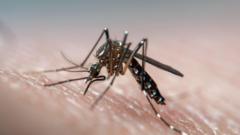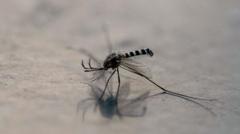Researchers from the University of California have created a novel strategy to tackle diseases spread by mosquitoes by turning male insects deaf, disrupting their mating process and consequently decreasing their population, which may curb the incidence of diseases like dengue, Zika, and yellow fever.
Groundbreaking Approach to Combat Mosquito-Borne Diseases: Deafening the Males

Groundbreaking Approach to Combat Mosquito-Borne Diseases: Deafening the Males
Scientists develop a unique method to reduce dengue and other diseases by genetically modifying male mosquitoes to be deaf, making them unable to mate effectively.
In a pioneering scientific endeavor, researchers have found an innovative approach to combat mosquito-borne diseases, such as dengue fever, yellow fever, and Zika virus, by rendering male mosquitoes deaf. This novel technique aims to significantly hinder mating behaviors, thus reducing the overall mosquito population responsible for propagating these diseases.
The brains behind this groundbreaking research involves a team from the University of California, Irvine, who focused on Aedes aegypti mosquitoes—known carriers of viruses that infect approximately 400 million people annually. Mosquito mating typically occurs in mid-air, with males relying heavily on their auditory senses to pursue females, fixating on their distinctive wingbeat sounds.
Through meticulous experimentation, the researchers succeeded in modifying a genetic pathway crucial for hearing in male mosquitoes. By targeting a specific protein known as trpVa, essential for sound detection, they were able to create male mosquitoes that exhibited no response to the attractive flight tones and wingbeats of potential mates. This alteration resulted in the males remaining entirely incapable of mating, even after extended exposure to females in controlled environments.
The published findings, detailed in the journal PNAS, confirmed that mating among these genetically altered “deaf” males was entirely nonexistent, rendering their reproductive efforts futile. Dr. Joerg Albert, a noted expert on mosquito reproduction from the University of Oldenburg, emphasized the significance of this research, viewing it as a promising pathway for future mosquito control efforts.
However, he also cautioned about the ramifications of such genetic manipulations, noting the ecological role of mosquitoes within food chains, as sustenance for various animals and vital pollinators. While alternative methods for controlling mosquito populations, including the release of sterile males, are also being explored, the complete genetic shutdown of male hearing presents an unprecedented tool in the ongoing battle against mosquito-borne diseases.
This research highlights not just scientific innovation but also underscores the delicate balance within ecosystems, reminding us that while controlling disease is critical, preserving ecological harmony is equally important. The future of these mosquito control strategies might find a synthesis that both mitigates health risks and respects the intrinsic roles of these insects.





